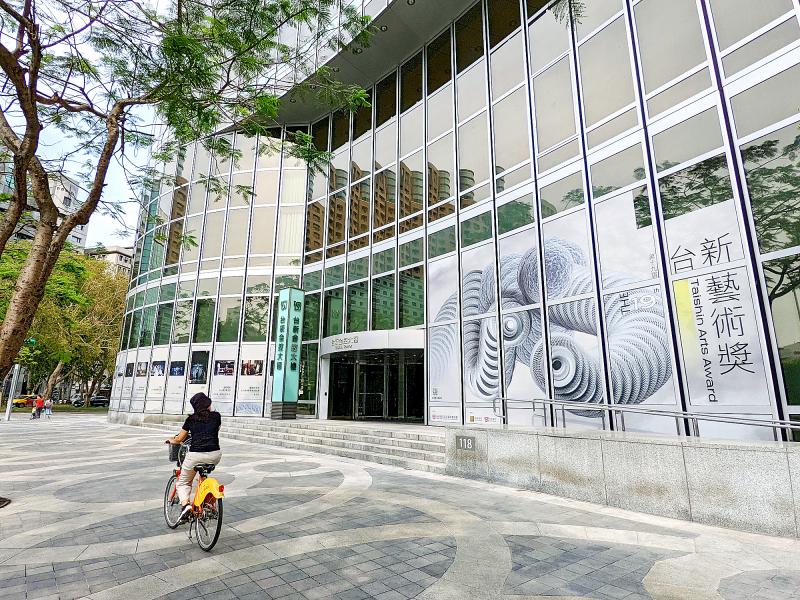Taishin Financial Holding Co Ltd (台新金控) has briefed the Financial Supervisory Commission (FSC) on a tentative plan to sell new shares to raise funds for the acquisition of Prudential Life Insurance Co of Taiwan (保德信人壽).
While the company has yet to formally apply for FSC approval of the share sale plan, the share sale seems to have a few advantages over previous plans, Banking Bureau Chief Secretary Phil Tong (童政彰) told a videoconference on Tuesday.
Since last year, the commission has rejected several fundraising plans proposed by Taishin Financial due to fuzzy feasibility and unclear financial arrangements.

Photo: CNA
Under the new plan, Taishin Financial would issue 800 million class F preferred shares to raise money and let investors decide whether to transfer the preferred stocks to Chang Hwa Commercial Bank Ltd (CHB, 彰銀) common shares from the eighth year of the issuance, Tong said.
The share swap ratio would be one Taishin Financial preferred share to one CHB common share, the plan says.
Taishin Financial’s plan is to be discussed at its annual shareholders’ meeting.
From the 11th year, Taishin Financial could redeem all of the outstanding class F preferred stocks in exchange for CHB common shares, and if CHB’s share price is lower than the issued price of the class F preferred stocks, Taishin would make up the difference in cash, the plan says.
To enable the financial arrangement, Taishin Financial needs to amend its bylaws, which requires the approval of its shareholders, the commission said.
“The new share sale plan has a more specific structure than previous plans, and as the preferred stocks cannot be changed into CHB shares until the eighth year, the share swap would have a smaller impact on the market than an immediate share swap,” Tong said.
However, it is uncertain whether an eight-year arrangement is reasonable and if Taishin Financial could issue new shares to be exchanged for another firm’s shares, he said.
“So far, no firm in Taiwan has conducted such as unique share arrangement,” Tong said.
While the issuance of new preferred stocks would boost Taishin Financial’s capital adequacy, the swapping of shares from the eighth year would reduce its capital adequacy, Tong said.
If the commission approves the new plan, it would demand that the firm strengthen its capital adequacy before the share swap, he said.
How Taishin Financial raises the funds would not be the focus of a bureau review, Insurance Bureau Director-General Shih Chiung-hwa (施瓊華) said.
The bureau is mostly concerned that Taishin Financial has enough capital to support Prudential Life Taiwan after insurers are required to follow stricter solvency rules, she said.
“We don’t care if Taishin Financial directly sells its CHB shares or issues new preferred stocks, but we need to ensure that Taishin Financial has enough money,” Shih said.
Taishin Financial’s share price yesterday gained 0.34 percent to close at NT$14.7, while CHB’s share price rose 1.81 percent to NT$16.9 per share, Taiwan Stock Exchange data showed.

Intel Corp chief executive officer Lip-Bu Tan (陳立武) is expected to meet with Taiwanese suppliers next month in conjunction with the opening of the Computex Taipei trade show, supply chain sources said on Monday. The visit, the first for Tan to Taiwan since assuming his new post last month, would be aimed at enhancing Intel’s ties with suppliers in Taiwan as he attempts to help turn around the struggling US chipmaker, the sources said. Tan is to hold a banquet to celebrate Intel’s 40-year presence in Taiwan before Computex opens on May 20 and invite dozens of Taiwanese suppliers to exchange views

Application-specific integrated circuit designer Faraday Technology Corp (智原) yesterday said that although revenue this quarter would decline 30 percent from last quarter, it retained its full-year forecast of revenue growth of 100 percent. The company attributed the quarterly drop to a slowdown in customers’ production of chips using Faraday’s advanced packaging technology. The company is still confident about its revenue growth this year, given its strong “design-win” — or the projects it won to help customers design their chips, Faraday president Steve Wang (王國雍) told an online earnings conference. “The design-win this year is better than we expected. We believe we will win

Chizuko Kimura has become the first female sushi chef in the world to win a Michelin star, fulfilling a promise she made to her dying husband to continue his legacy. The 54-year-old Japanese chef regained the Michelin star her late husband, Shunei Kimura, won three years ago for their Sushi Shunei restaurant in Paris. For Shunei Kimura, the star was a dream come true. However, the joy was short-lived. He died from cancer just three months later in June 2022. He was 65. The following year, the restaurant in the heart of Montmartre lost its star rating. Chizuko Kimura insisted that the new star is still down

While China’s leaders use their economic and political might to fight US President Donald Trump’s trade war “to the end,” its army of social media soldiers are embarking on a more humorous campaign online. Trump’s tariff blitz has seen Washington and Beijing impose eye-watering duties on imports from the other, fanning a standoff between the economic superpowers that has sparked global recession fears and sent markets into a tailspin. Trump says his policy is a response to years of being “ripped off” by other countries and aims to bring manufacturing to the US, forcing companies to employ US workers. However, China’s online warriors